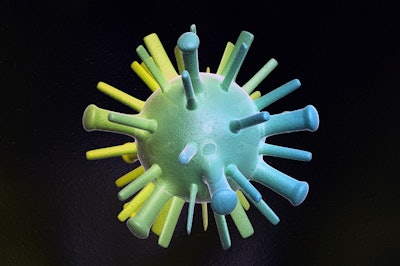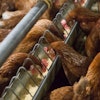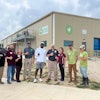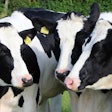
Vaccination against highly pathogenic avian influenza (HPAI) is unlikely in the U.S. today. However, it could be a possibility in the future.
Rumor or reality?
In March 2023, the New York Times reported the administration of President Joe Biden was considering ordering vaccination in response to the current outbreak of HPAI. The latest outbreak arrived in North America at the end of 2021 and continues to be active with outbreaks around the country.
The original report mentioned a vaccination campaign, but for now, that is not technically possible in the U.S. Moreover, there is stiff resistance to any sort of vaccine mandate primarily due to international trade concerns.
Nevertheless, vaccination is already routine in some countries and the idea is gaining traction globally. Dr. John Clifford, the USA Poultry & Egg Export Council’s veterinary trade advisor, said this current outbreak of the H5 strain of avian influenza is different because its present in all major flyways of the world, forcing the disease onto the world stage.

Years away
In a statement, the U.S. Poultry & Egg Association (USPOULTRY) said vaccination of commercial poultry birds in the U.S. for HPAI “would not be an overnight occurrence.”
The USPOULTRY statement said it would take about two years before any significant vaccine rollout could happen. Multiple barriers, most notably in international trade, would need to be overcome.
Any kind of vaccination program, USPOULTRY said, would be regulated by the federal government which would also be charged with supplying the vaccines.
USPOULTRY is an industry group representing producers and processors of broilers, turkeys, ducks, eggs and breeding stock, as well as allied companies.
In a statement, Mike Stepien, a spokesman for the U.S. Department of Agriculture’s Animal and Plant Health Inspection Service (APHIS), said “USDA continues to research vaccine options that can protect poultry from this persistent threat.”
“First and foremost, however, we are pursuing collaborative efforts with poultry farmers and companies on education, training and implementation of comprehensive biosecurity measures,” the statement said. “Biosecurity is the best and most prudent approach we have to mitigate the impact of the disease today.
“From vaccine development, to production timelines, to dissemination to flocks, there are many factors that make implementing a vaccine strategy a challenge and it would take time to deliver an effective vaccine.”
Vaccination of commercial broilers against HPAI is unlikely due to their short lifespan but it could be a more appealing option for longer-lived birds. If it came to it, USPOULTRY said a vaccination order would only come at the “end of a long, collaborative discussion with all stakeholders including the industry.”
Broilers
The National Chicken Council (NCC), the trade group representing the broiler industry in Washington, said it does not currently support the use of a vaccine for HPAI primary due to trade concerns.

The top U.S. broiler companies produced more than 1 billion pounds of ready-to-cook chicken on a weekly basis in 2022, according to WATT PoultryUSA data, and a significant portion, 18%, of that meat was exported. Super said if the U.S. began vaccinating, the industry would lose this $5 billion annual revenue source.
Given the current international trade situation, if any one sector of the commercial poultry industry were to begin vaccinating then broiler exports would be impacted.
“Even if one sector (eggs, turkeys) moves forward with a vaccine, the broiler industry will be impacted as our trading partners view all poultry the same,” Super said.
Furthermore, the NCC believes the broiler industry would be disproportionately harmed since most of the birds affected by the disease are not broilers.
“We support ongoing discussions about a vaccination program, but currently we support the eradication policy of APHIS and believe that right now this is the best approach at eliminating HPAI in the U.S.,” Super said.
Turkeys
The National Turkey Federation (NTF), the group representing the turkey industry in Washington, was more receptive to vaccination in its comments to WATT PoultryUSA.

In a statement, the NTF said the U.S. cannot require any vaccination without a proven, effective vaccine and without taking the appropriate steps to ensure a massive disruption in trade is avoided. That said, it supports the USDA moving ahead with developing a vaccination program to address HPAI over the long term.
“NTF remains strongly supportive of the process of developing a vaccination strategy,” the statement said. “The U.S. needs to pursue this regardless of whether the current outbreak remains active or not.”
The NTF recognizes the sizable barriers that exist between the status quo and vaccination. The largest one, it said, is the trade barrier presented by the prevailing view of vaccination in intentional trade.
New, specific agreements would be needed to allow one sector or one geographic area to vaccinate while another does not. The NTF noted in 2015, individual, international trade agreements were modified based on a “new, more modern understanding of the management of an HPAI outbreak.” A similar path could be followed in 2023.
In the European Union, new vaccines designed to address the current strain of HPAI are being tested. International agreements in the political block are also under consideration to facilitate trade of vaccinated products. This could set the stage for the rest of the world.
The current view is based on the perception that importers can’t distinguish between products from a vaccinated bird and an unvaccinated one. A working agreement would require what is known as a DIVA, differentiation between infected and vaccinated animals, vaccination strategy and monitoring to ensure separation between vaccinated and unvaccinated products.
“NTF is confident a surveillance strategy can be developed to ensure the safety of our export products to our trading partners,” the NTF statement said.
Finally, the NTF doesn’t support vaccination as a long-term solution to HPAI in the U.S. Vaccination, it said, should be conducted for a limited period, not as a permanent, on-going control program.
Wishful thinking on HPAI from the Biden administration www.WATTAgNet.com/articles/46938



















